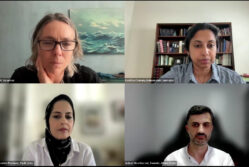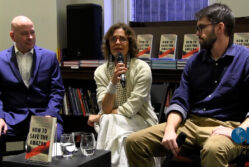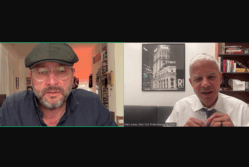Event Coverage Highlight

Curbing the Risks as Attacks on Reporters Escalate
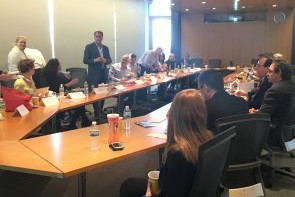
The fourth annual Foreign Editors Circle meeting was hosted by The GroundTruth Project at WGBH in Boston. Photo: Beth Murphy/GroundTruth
By Michael Serrill
It’s dangerous to be an international journalist.
That message was delivered emphatically at the fourth annual Foreign Editors Circle meeting in May. More than 20 representatives of news outlets and associations, including me and executive director Patricia Kranz from the OPC, convened at the offices of public radio outlet WGBH and painted a dire portrait of a globe where unbiased reporting – let’s call that truth-telling – is not just unwelcome, but often punished with imprisonment and murder. As the participants noted, Russia and China have reverted to a level of media repression not seen since the heyday of communism. (President Xi Jinping of China recently told editors there that their only function was to support his government’s ideology.) In Europe, reporters are under pressure from Hungary to Greece to Spain. Regimes across the Middle East and Central Asia are cracking down harder than ever, with Turkish President Recep Erdogan going so far as to demand that a German media mogul rescind his support for a beleaguered Turkish comedian who mocked Erdogan.
Much of the daylong Boston meeting – co-sponsored by the Vienna-based International Press Institute, the Associated Press and Charles Sennott’s GroundTruth Project – focused on the continuing dangers of reporting from war-torn Syria, Iraq and Afghanistan. The Foreign Editors Circle and the OPC were early backers of the global effort to train and protect freelancers working in conflict zones. That initiative has blossomed into the ACOS Alliance – ACOS stands for A Culture of Safety – which now has more than 85 members representing major news organizations. ACOS board member David Rohde of Reuters – a kidnap victim in Pakistan – used the Boston forum to quiz editors on the responsibilities of editors before they send reporters, freelance or otherwise, into zones of conflict. After compiling recommendations from freelancers, ACOS developed the Assignment Safety Checklist – a set of questions that editors and reporters should discuss before a dangerous assignment. You can get a copy from the ACOS website acosalliance.org or from David at
David.Rohde@thomsonreuters.com.
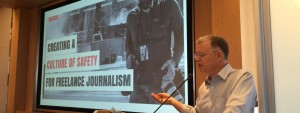
David Rohde of Reuters, leads a session at the Foreign Editors Circle meeting on May 13. Photo: Charles Sennott
Among the checklist’s provisions: that the editor determine the reporter has had conflict reporting experience, plus safety, first aid and other training; that the reporter complete a risk assessment before the assignment, and have a method for keeping in communication with the news organization and an emergency evacuation plan. Editors should make certain reporters are provided with whatever expense money and equipment – such as helmet and flak jacket – they will need on the assignment. One crucial requirement: that reporters have the capability to quickly scrub their phones, tablets or computers so that if he is arrested or taken captive local reporters and sources he has been working with will not be compromised. Some of the checklist items are necessarily macabre: what will the news organization do if the journalist is captured, injured or killed? Does the reporter have an up-to-date will?
“It’s critical that editors and reporters talk over worst-case scenarios – and each side’s responsibilities – before agreeing on an assignment,” Rohde said in an email. “Both reporters and editors will benefit.”
The latest battlefield in the war against independent journalism is on the Internet. At the Boston meeting, IPI’s Javier Luque, speaking from Vienna on Skype, described a rising tide of “harassment of journalists, bloggers and citizen journalists” around the world. To fight the trend, IPI has launched a new program called On the Line, designed to give journalists around the world a secure outlet to report threats and intimidation. (Go to www.ontheline.media.) The program is now being tested in Turkey and Jordan. In the latter nation, Luque said, “traditional media has legal protections that online journalists don’t.” One threat to the online crowd: charges of defamation if they criticize government officials.
One threat – perhaps the biggest – to international journalism doesn’t come through the barrel of a gun: a paucity of money. GroundTruth’s Sennott noted that at this juncture few major American news organizations employ any foreign correspondents simply because it is too expensive. At GroundTruth, he says he spends an inordinate amount of time raising funds from foundations to sponsor his reporting projects. Said Sennott: “New revenue models ae needed.”
Michael S. Serrill, a former president of the OPC, was a foreign editor for Bloomberg News, BusinessWeek and TIME.

